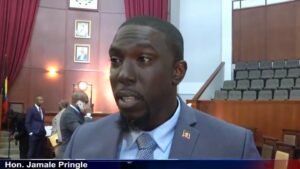Tanzania's main opposition party, Chadema, has been disqualified from the forthcoming elections following recent actions that could impact the political landscape.
Tanzania's Opposition Party Excluded from Upcoming Election

Tanzania's Opposition Party Excluded from Upcoming Election
Opposition leader Tundu Lissu charged with treason as party fails to sign election code
In a critical decision, Tanzania's Independent National Elections Commission announced that Chadema would not be allowed to participate in the October elections. This ruling came just days after the party's leader, Tundu Lissu, was arrested and charged with treason following a rally where he advocated for electoral reforms. According to Ramadhani Kailima, the Commission’s director of elections, Chadema's failure to sign a mandatory code of conduct document led to the disqualification. The party will also be banned from entering any by-elections until 2030.
Lissu's recent legal challenges have intensified the political climate in Tanzania, as he was expected to contest against the current president, Samia Suluhu Hassan, in the upcoming elections. President Hassan’s government, which assumed power in 2021, had previously been seen as a harbinger of political reforms but now faces accusations of repressing dissent among opposition activists.
Chadema's refusal to participate in signing the code of conduct reflects its stance that significant electoral reforms are essential for a legitimate electoral process. The party argues that the current operations of the electoral commission require reevaluation, fearing that the existing framework heavily favors the ruling Chama Cha Mapinduzi (CCM), which has maintained power since 1977.
Charges against Lissu have sparked allegations of political maneuvering, with his lawyer asserting that the treason accusations are intertwined with political motives. Lissu has faced multiple arrests and a past assassination attempt, underscoring the precarious nature of opposition politics in Tanzania. The treason case against Lissu has been adjourned until April 24, amid ongoing tensions regarding electoral integrity and governance in the country.
Lissu's recent legal challenges have intensified the political climate in Tanzania, as he was expected to contest against the current president, Samia Suluhu Hassan, in the upcoming elections. President Hassan’s government, which assumed power in 2021, had previously been seen as a harbinger of political reforms but now faces accusations of repressing dissent among opposition activists.
Chadema's refusal to participate in signing the code of conduct reflects its stance that significant electoral reforms are essential for a legitimate electoral process. The party argues that the current operations of the electoral commission require reevaluation, fearing that the existing framework heavily favors the ruling Chama Cha Mapinduzi (CCM), which has maintained power since 1977.
Charges against Lissu have sparked allegations of political maneuvering, with his lawyer asserting that the treason accusations are intertwined with political motives. Lissu has faced multiple arrests and a past assassination attempt, underscoring the precarious nature of opposition politics in Tanzania. The treason case against Lissu has been adjourned until April 24, amid ongoing tensions regarding electoral integrity and governance in the country.




















